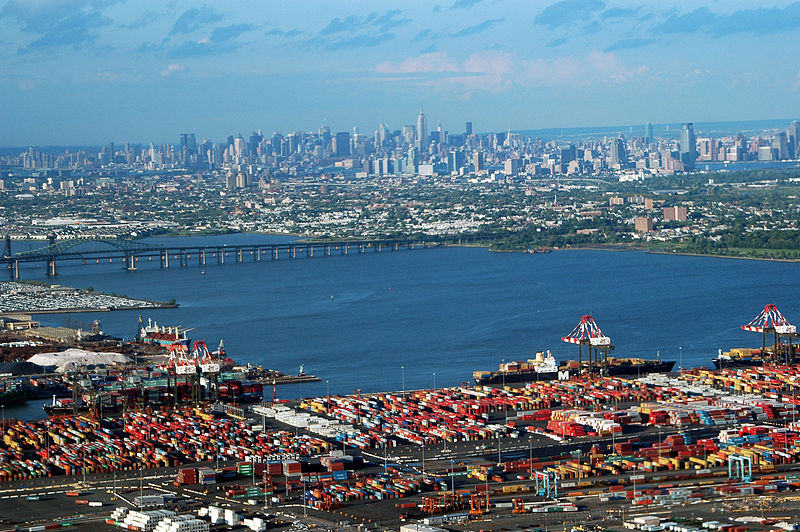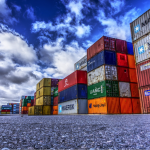Another Foreign Company Purchases U.S. Port Terminals & ILWU Ratifies Contract
Did you know that most U.S. port terminals are owned and operated by foreign entities? Do you find that a concerning fact about these important access points to the country? If that seems like a national security problem to you, you probably won’t love this news. CMA CGM just bought two container terminals at the Port of New York and New Jersey.
Greg Knowler reported in the Journal of Commerce (JOC):
CMA CGM completed its acquisition of two container terminals at the Port of New York and New Jersey this week, strengthening the carrier’s footprint on the US East Coast which continues to capture a growing share of Asia-US business from West Coast ports.
The terminals — Bayonne in New Jersey and Howland Hook in New York sold by Canada’s Global Container Terminals — expand CMA CGM’s portfolio of US terminals to seven.

Since the terminals were already owned and operated by a foreign entity, maybe it doesn’t seem to matter that a foreign company purchased them. However, foreign entities selling U.S. port terminals to other foreign entities doesn’t really seem less concerning.
When I started writing about international shipping over a decade ago, around 80% of U.S. terminals were owned and operated by foreign entities. Sadly, I haven’t really seen any data to suggest a reversal of that trend.
One of our top-read blog posts from about 4 years ago was about the Trump administration forcing China’s state-owned COSCO to sell a major terminal at the Port of Long Beach. It wasn’t a story that got very much media attention, but I haven’t seen much else where a foreign-owned terminal switched ownership to a U.S.-based organization. One would think that would be something of a significant story. Adding to the background of that story, we were in the middle of an intense trade war with China, and China owning and operating a major U.S. port terminal seemed a particular national security issue.
The increased readership of that post does indicate people are concerned with the topic of foreign ownership of U.S. port terminals. Of course, Trump and China playing a part in that previous story likely upped the amount of views it received as well.
While CMA CGM purchasing the terminals at the Port of New York and New Jersey doesn’t involve Trump or China, it is still significant for us to consider who’s in charge at these major gateways to the country. There’s no doubt the companies controlling them understand how critical these terminals are. A quote from Knowler’s article makes that clear:
“These two new assets provide the group with flagship terminal operations at a critical entry point on the US East coast,” CMA CGM said in a statement Friday.
CMA CGM’s terminals include ones on both U.S. coasts with their most recent terminal acquisition deals. Knowler reports:
CMA CGM’s East Coast deal follows its acquisition of the Fenix Marine Services container terminal in Los Angeles in late 2021.
ILWU Ratifies New Contract
In other U.S. port related news, the International Longshore & Warehouse Union (ILWU) ratified the master contract reached between the dockworkers union and the West Coast port employers represented by the Pacific Maritime Association (PMA).

Bill Mongelluzzo reported in the JOC last week:
The rank-and-file of the International Longshore and Warehouse Union (ILWU) have voted overwhelmingly to ratify the new six-year coastwide contract with the Pacific Maritime Association (PMA), the ILWU said Thursday. The union said in a statement that 75% of ILWU members voting agreed to ratify the deal, which was nailed down in June after 13 months of contentious negotiations.
With the big salary increase and bonus ILWU members will see with the new contract, one would think the rank-and-file would overwhelmingly vote in favor of the new contract. Mongelluzzo includes the following details about the contract in his brief article:
The new contract calls for a 32% salary increase over six years that will be paid retroactively to July 1, 2022, plus a one-time $70 million bonus spread throughout the ILWU’s 20,000-strong membership for working through the COVID-19 pandemic.
With the contract running until July 1st, 2028, we have a handful of years before we see union slowdowns at the ports to gain negotiation leverage. There are quotes out there now that say this ratification will start bringing back discretionary cargo that was lost to the East Coast during the contentious contract negotiations. Some of it likely will come back; however, I expect a portion of it to be permanently lost. Shippers are tired of their cargo being used as ransom every time a new ILWU contract has to be negotiated.
Knowler’s article about CMA CGM’s acquisition of Port of New York and New Jersey terminals actually contained fresh data on the market share East Coast ports have gained on West Coast ports:
The share of Asian imports landing on the West Coast in July fell to 53.1%, down from 59.3% in June and the lowest since last November, according to data from PIERS, a sister company of the Journal of Commerce within S&P Global. The share was 60.4% when longshore contract talks began in May 2022.
US imports from Asia increased for the fifth consecutive month in July to 1.46 million TEUs — the highest since last September, while the East Coast increased its share of that volume to 37.7% from 32.9% in June.
A great deal of investment has been put into and is committed to increasing the capacity East Coast ports. The trend in its market share increase looks likely to continue in the long-term future.





